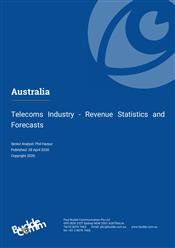Australia - Telecoms Industry - Revenue Statistics and Forecasts

Last updated: 28 Apr 2020 Update History
Report Status: Archived
Report Pages: 51
Analyst: Sebastien De Rosbo
Synopsis
While fixed-line telephony traffic and revenue are declining, the mobile broadband market is growing steadily. Fixed-line broadband on the copper network are also declining as fibre and fixed-wireless broadband services become more widely available, through the NBN’s multi-technology architecture, with its emphasis on VDSL with Fibre-to-the Node (FttN). In time, much of the voice traffic will be data packet via technologies such as Voice over Long-term Evolution (VoLTE).
Penetration in the fixed line market in Australia has been declining at a significant and increasing rate over the past five years. A major reason for this is due to the dominance of the mobile segment and the growth of the mobile broadband segment. The market is predicted to further decline over the next five years to 2024 as both mobile and mobile broadband penetration continue to increase.
The release of spectrum for LTE mobile broadband use, as well as increased uptake by consumers and businesses, is helping to offset the decline in revenue from fixed-line services, although as user uptake increases so will the amount of bandwidth consumed.
Other sources of revenue for the major telcos include broadband, data and IP access, business services and applications, cloud computing and other telco services. New revenue streams from fibre and cloud computing in particular are assisting the telcos to compensate for their losses from revenues from traditional revenue streams.
The second-tier market continues to grow strongly although eased off to some degree during 2019. Developments in this market have been dominated by industry consolidation a process that is set to continue over coming years, despite the temporary setback after the failed Vodafone and TPG merger.
This report provides statistics on revenue and market forecasts as well as analyses for the Australian telecommunications market by major providers and service. The telecoms service market is segmented according to the major providers Telstra, Optus, Vodafone, as well as second-tier market providers including Vocus- M2, TPG and Macquarie Telecom.
BuddeComm notes that the outbreak of the Coronavirus in 2020 is having a significant impact on production and supply chains globally. During the coming year the telecoms sector to various degrees is likely to experience a downturn in mobile device production, while it may also be difficult for network operators to manage workflows when maintaining and upgrading existing infrastructure. Overall progress towards 5G may be postponed or slowed down in some countries.
On the consumer side, spending on telecoms services and devices is under pressure from the financial effect of large-scale job losses and the consequent restriction on disposable incomes. However, the crucial nature of telecom services, both for general communication as well as a tool for home-working, will offset such pressures. In many markets the net effect should be a steady though reduced increased in subscriber growth.
Although it is challenging to predict and interpret the long-term impacts of the crisis as it develops, these have been acknowledged in the industry forecasts contained in this report.
The report also covers the responses of the telecom operators as well as government agencies and regulators as they react to the crisis to ensure that citizens can continue to make optimum use of telecom services. This can be reflected in subsidy schemes and the promotion of tele-health and tele-education, among other solutions.
Key developments:
- The mobile broadband market is predicted to grow steadily over the next five years to 2024.
- Fixed-line DSL broadband is declining as fibre and fixed-wireless broadband services become more widely available.
- The second-tier market continues to grow strongly although eased off to some degree during 2019.
- Assessment of the global impact of COVID-19 on the telecoms sector.
Companied mentioned in this report include:
Vodafone, 3, VHA, Optus, Telstra, iiNet, TPG, Vocus, Macquarie Telecom
Related Reports
- Australia - Telecoms, Mobile and Broadband - Statistics and Analyses
- Australia - Data Centre Market
- South Pacific Islands - Telecoms, Mobile and Broadband - Statistics and Analyses
- Samoa - Telecoms, Mobile and Broadband - Statistics and Analyses
- Papua New Guinea - Telecoms, Mobile and Broadband - Statistics and Analyses
- New Zealand - Telecoms, Mobile and Broadband - Statistics and Analyses
- French Polynesia - Telecoms, Mobile and Broadband - Statistics and Analyses
- New Caledonia - Telecoms, Mobile and Broadband - Statistics and Analyses
- Vanuatu - Telecoms, Mobile and Broadband - Statistics and Analyses
Share this Report
TMT Intelligence
A platform to scale your intelligence tasks
Monitor critical insights with our AI-powered Market Intelligence Platform gathering and analyzing intelligence in real time. With AI trained to spot emerging trends and detect new strategic opportunities, our clients use TMT Intelligence to accelerate their growth.
If you want to know more about it, please see:
Research Methodology
BuddeComm's strategic business reports contain a combination of both primary and secondary research statistics, analyses written by our senior analysts supported by a network of experts, industry contacts and researchers from around the world as well as our own scenario forecasts.
For more details, please see:
More than 4,000 customers from 140 countries utilise BuddeComm Research
Are you interested in BuddeComm's Custom Research Service?
Hot Topics
News & Views
Have the latest telecommunications industry news delivered to your inbox by subscribing to BuddeComm's weekly newsletter.